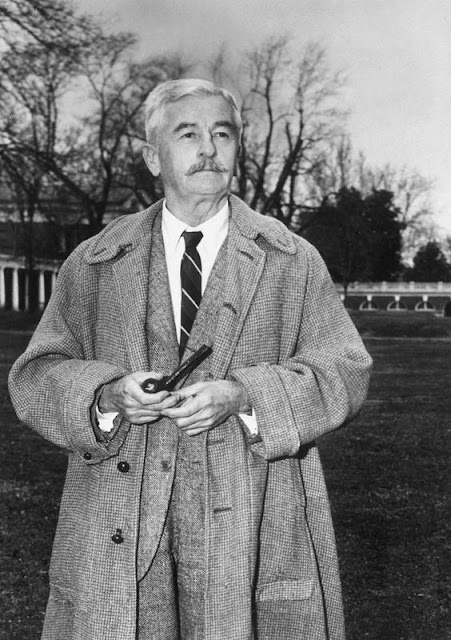The Impossible Cool: William Faulkner (25 September 1897-6 July 1962)
William Faulkner became known for his faithful and accurate diction of Southern speech.
He bodly illuminated social issues that many American writers left in the dark, like slavery, the "good old boys" club and Southern aristocracy.
In 1931, Faulkner decided to punish Sanctuary,
which shocked and appalled some readers,
but it was a commercial success and a critical breakthrought for his career.
Faulkner experienced both elation and soul-shocking sadness during this time in his career.
Between the publishing of the Sound and the Fury and the Sanctuary, his old flame, Estelle Oldham, divorced Cornell Franklin.
Still deeply in love wih her,
Faulkner promptly made his feelings known, and the two were married within six months.
Estelle became pregnant, and in January of 1931, she gave birth to a daughter, whom they named Alabama.
The premature baby lived for just over a week.
Light in Aughust (1932) tells a story of Yoknapatawpha County outcasts.
He introduces his readers to Joe Christmas, a man of uncertain racial makeup;
Joanna Burden, a woman who supports voting rights for blacks an later is brutally murdered;
Lena Grove, an alert and determined young woman in search of her baby's father;
and Rev. Gail Hightower, a man besieged by visions.
Time magazine listed it as one of the 100 best English-language novels from 1923 to 2005.
After publishing notable books, Faulkner turned to screenwriting.
After Faulkner's father died, and in need of money, he decided to sell the rights to film Sanctuary, later titled The Story of Temple Drake (1933).
That year, Estelle gave birth to Jill, the couple's only surviving child.
Between 1932 and 1945, Faulkner travelled to Hollywood to toil as a scriptwriter and contributed to or wrote countless films.
Uninspired by the task, he did it for purely financial gain.
During this period, Faulkner published severall novels, including the epic family saga Absalom, Absalom! (1936) the satirical Hamlet (1940) and Go Down, Moses (1942)
In 1946, Malcolkm Cowley published The Portable Faulkner and interest in Faulkner's work was revived.
Two years later, Faulkner published Intruder in the Dust, the tale of a black man falsely accused of murder.
One of Faulkner's greatest professional moments came when he was awarded the 1949 Nobel Prize in Literature, receiving the award the following year.
The committee deemed him one of the most important writers of American letters.
From Biography




Comments
Post a Comment